
How to Master Intuitive Eating
In this article, I only talk about how to master intuitive eating. I went over the pros and cons of it in a previous article, so read that one first.
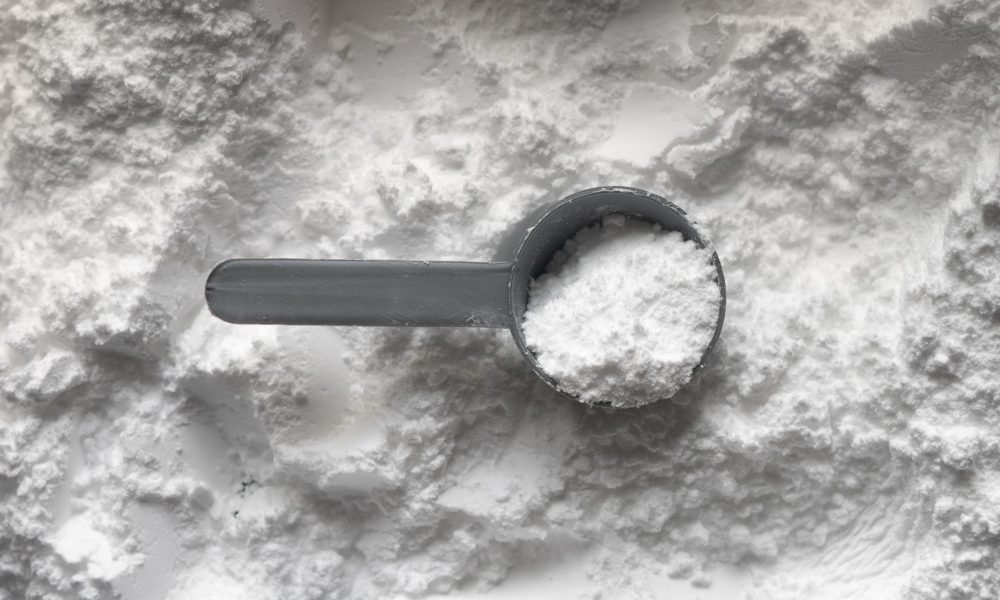
Have you heard of creatine? Your mom probably thinks it’s a steroid, but who cares what she thinks. Creatine is epic and I don’t say that about many supplements.
In a world where so many supplements simply make your piss more expensive, creatine is the knight in shining armor that actually gets the job done.
During high intensity exercise, your body’s demand for energy (ATP) skyrockets (1). As your ATP depletes, performance drops. However, creatine helps resurrect ATP which buffers against fatigue.
This is why creatine also buffers against metabolic stress which is that blood gorging pump feeling that makes it hard to complete your sets (2).
However, creatine only works when your muscles are increasingly saturated with it along with the water it draws into your muscle cells. You can get creatine through foods like beef and fish, but the dose in food is too minimal to make a difference, thus supplementation is the way to go.
Supplemental creatine also contains no animal by-products, so dorky vegans can also take it assuming it’s not in pill form which has a gelatin covering (3).
Creatine increases your strength, power, and endurance performance (4-8). It gives you that edge that everybody looks for in a supplement. This performance boost can translate to additional muscle growth, but creatine already directly increases muscle size via a few mechanisms.
It does so with a proportional increase in water and muscle cell growth (9-13). When you diet, the enhanced protein balance also helps you retain more muscle mass as well (14). Due to muscle cells absorbing water, the scale will go up temporarily. In fact, the scale going up indicates it working and your muscles responding well to it.
This is normal and doesn’t make you look bloated because, the additional water goes into your muscles not under your skin. You end up looking more muscular, not soft and puffy (45,46,47).
Creatine also doesn’t cause dehydration as occasionally rumored (30). That’s counterintuitive towards its primary mechanism.
Grab my free Stupid Simple Scroll to Mastering Hypertrophy
Thick muscles are cool, but bone health is too. Because creatine improves performance, you will likely impose more adaptations to bone structure, not to mention bones also rely on atp as well.
Indeed some research finds this is especially true when paired with consistent strength training (15,16,67). In older adults, the bone benefits may even be independent of exercise (62).
Creatine is also stored in the brain and creatine brain deficiency can stunt brain development (17,18). Creatine is so powerful in this regard, it can even be taken during pregnancy for the fetus or within children to enhance brain development (30).
Thus, we see creatine have the following brain benefits in a wide range of populations (19,20,21):
Vegetarians, older adults, and stress prone individuals benefit generally benefit more (22). And because creatine nourishes the brain, it’s also been shown to help with depression (23,24).
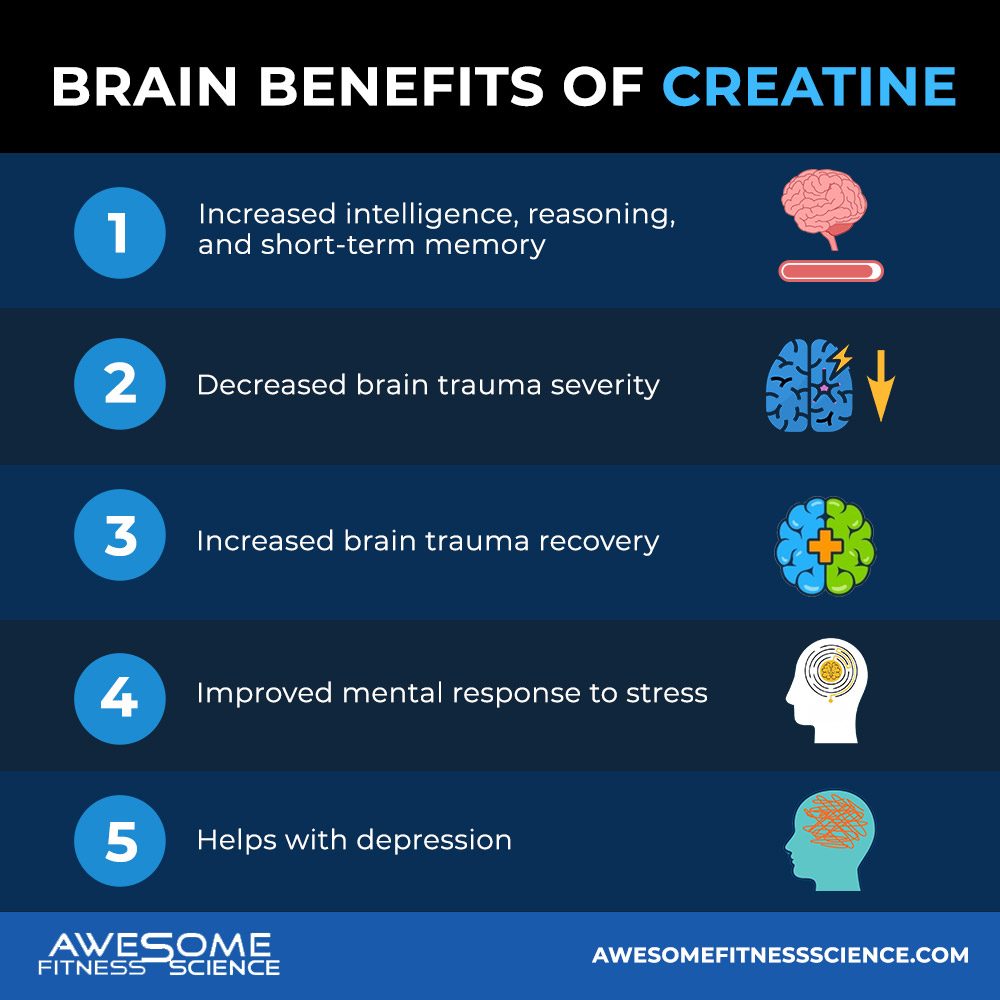
There are many forms of creatine, but creatine monohydrate is king (32). Creatine hydrochloride, creatine ethyl ester, creatine alkaline, creatine kre-alkalyn, creatine citrate, creatine pyruvate, creatine chelate, creatine malate, and creatine nitrate are all either comparable or worse than creatine monohydrate (25,26,27,63,64).
Interestingly enough, creatine monohydrate is also the cheapest. All other forms have to rely on fancy marketing by airhead meatheads along with inflated prices to swindle gullible consumers.
Human psychology likes to think when something is more expensive or promoted by famous influencers, it must be better (28). But in the case of creatine, the cheapest form is actually best. Balling on a budget, am I right?
Creatine monohydrate is easily absorbed and can fully saturate your muscles (29,30). It doesn’t lack any firepower that other forms can make up, not to mention, it’s exponentially more researched than other forms.
Furthermore, creatine powder (which is also cheaper) absorbs better than capsules (31). Powder is definitely preferable if you’re prone to digestion issues.
Creatine is also highly shelf stable especially in cooler temperatures. Generally speaking, you should consume it right after it’s dissolved in water though (33). Waiting a few hours may be ok too if you have to.
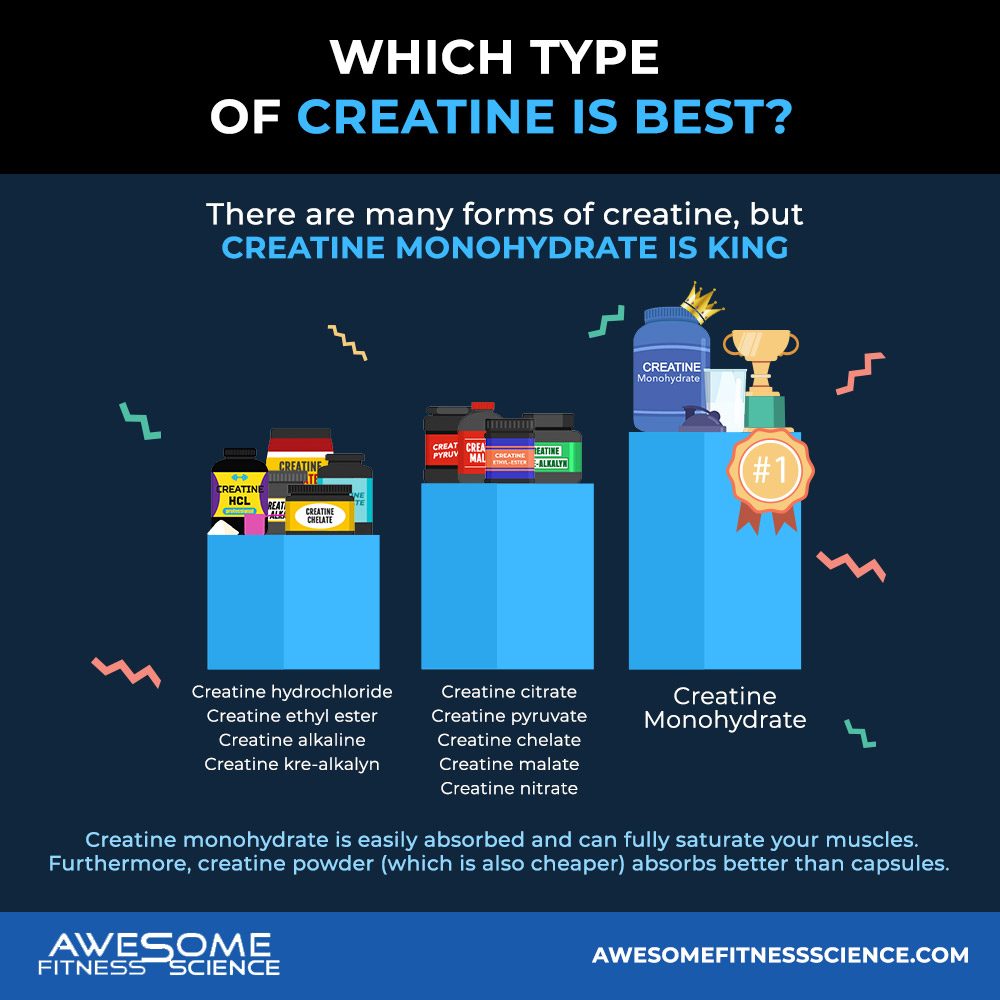
As for when to take it, creatine absorbs best in the presence of insulin or when you’re insulin sensitive. So if you want that extra edge, taking creatine post workout or with a meal is best (30,34-37,66). This increases absorption and generally prevents any digestive issues.
But ultimately, since creatine’s main mechanism is the accumulation of itself within your muscles, taking it at any time is generally fine in the long term.
Creatine loading refers to creatine virgins taking an above average dose to reach muscle saturation sooner because why wait a few weeks when you can have your cake right now?
Indeed, creatine loading can be a viable strategy to reach full muscle saturation within a week (38,68). To do so, you would take 20 grams of creatine daily for 5-7 days. Each day should have four 5-gram dose, each taken with a meal. This prevents or minimizes stomach pain, but people prone to stomach pain probably shouldn’t load up in the first place (39)
Taking the standard dose of 3-5 grams daily will fully saturate your muscles within 3-4 weeks anyways, so no need to creatine load if you want to keep things simple (40,41,42). Smaller people can aim for 3 grams while bigger people especially highly active ones should take 5 grams per day to continue maintaining high muscle creatine levels. If you miss a day, you can double up or not. It’s not a big deal.
Besides the potential for some stomach pain in prone individuals, there’s not much drawback to accidentally taking too much creatine. Long term, your body’s natural creatine production is the same (30).
Because there’s no real drawback to creatine supplementation, there is no need to cycle creatine. That’s a fat myth regurgitated by high school dropouts who want to sound smart.
Your body has a continual benefit from creatine. You can and should take creatine forever to keep muscle creatine levels full (30). In other words, you can take it till you die, so I generally recommend buying it in bulk to save money.
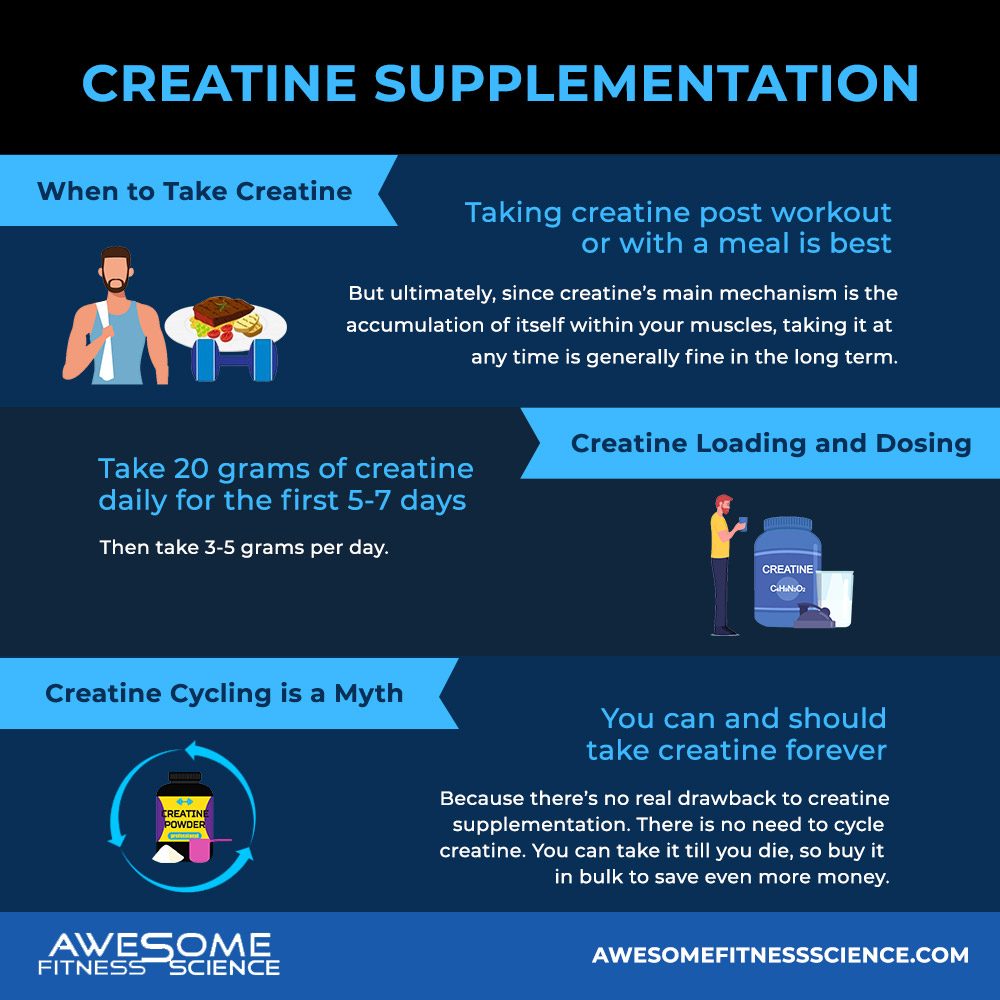
Some people respond better to creatine than others based on baseline creatine levels (43). I’m doubtful at the common term non-responder though as many people don’t take timing and dosing into consideration. Research also finds that people who benefit less from creatine usually have smaller muscles and less type 2 muscle fibers (44).
This makes sense as you wouldn’t have such a demand for energy replenishment if your force production is weak to begin with. So the performance/hypertrophy benefits of creatine may not be worth it until you have some decent muscle size.
In addition, creatine gets depleted quicker with intense exercise and muscle contractions, so benefits may favor more intense trainees exercising often.
So all good things must have a catch. Some preliminary research have found caffeine may negate the effects of creatine because of opposing muscle relaxation mechanisms or stomach pain from the combination (48,49,50).
One study actually found caffeine potentiated the effects of creatine, but the combination didn’t out perform the ingredients separately (51).
Another study found a creatine only group outperformed and grew more muscle than a caffeine + creatine group and the placebo group (65).
Furthermore, the combination may increase digestive issues which may be the true culprit (48,52,53).
All this to say, caffeine and creatine may not be the best of friends. Some pre-workout contains both which you’re likely fine to take as long as you don’t experience stomach issues.
But if you want to confidently maximize benefits, caffeine pre-workout and creatine post-workout (or any other time of day) makes the most sense.
The other potential side effect of creatine is hair loss in men, well sort of. Don’t get your insecurities in a bunch quite yet. This is a common claim based on 1 blurry study.
One 2009 study in Rugby players found increased DHT (dihydrotestosterone) without increasing testosterone (54). DHT is an androgen which explains creatine’s benefits, but it can also contribute to male hair loss. However, DHT has to bind to your hair follicles to cause hair loss. An increase in DHT doesn’t guarantee hair loss especially in healthy individuals.
In addition, DHT is a metabolite of testosterone which creatine doesn’t increase in that study and other studies, so it’s doubtful if the DHT increases are legitimate (55-58). In addition, the increases within the Rugby study were still within normal ranges (59).
DHT levels also increased 56% during creatine loading, but only stayed elevated at 40% once maintenance intake was taken, so any potential acceleration of hair loss doesn’t get further accelerated after loading.
Exercise also increases DHT levels which may be the lynchpin behind why creatine increases DHT due to creatine’s performance enhancing effects (60,61). And we know that reasonable exercise is generally good for hair health.
If you’re extremely prone to hair loss and want to be extra safe, you can avoid taking creatine. However, I’ve never noticed any increased hair loss in all my years of taking it and working with a variety of male clients taking creatine.
We need more research, but without a study actually measuring creatine and hair loss, you likely don’t have anything to worry about.
Creatine monohydrate is arguably the most researched and proven supplement. In a world where supplements consistently let you down and burn a hole through your wallet, creatine is effective and cheap.
Inconveniently though, traveling with creatine makes it look like you’re smuggling cocaine. If and when airport security questions you, simply say, “Chill out bro, that’s my creatine. It’s the white powder Jesus would approve of.” They’ll understand, but might keep some for themselves because you know, creatine is awesome.
Start taking it and don’t stop till you die.
1. Baker, Julien S, et al. “Interaction among Skeletal
Muscle Metabolic Energy Systems during Intense Exercise.” Journal of
Nutrition and Metabolism, Hindawi Publishing Corporation, 2010,
www.ncbi.nlm.nih.gov/pmc/articles/PMC3005844/.
2. Cholewa . “Effects of Dietary Sports Supplements on
Metabolite Accumulation, Vasodilation and Cellular Swelling in Relation to
Muscle Hypertrophy: A Focus on ‘Secondary’ Physiological Determinants.” Nutrition
(Burbank, Los Angeles County, Calif.), U.S. National Library of Medicine,
pubmed.ncbi.nlm.nih.gov/30682546/.
3. Kaviani, Mojtaba, et al. “Benefits of Creatine
Supplementation for Vegetarians Compared to Omnivorous Athletes: A Systematic
Review.” MDPI, Multidisciplinary Digital Publishing Institute, 27 Apr.
2020, www.mdpi.com/1660-4601/17/9/3041/htm.
4. JD;, Branch. “Effect of Creatine Supplementation on
Body Composition and Performance: a Meta-Analysis.” International Journal of
Sport Nutrition and Exercise Metabolism, U.S. National Library of Medicine,
pubmed.ncbi.nlm.nih.gov/12945830/.
5. Chilibeck, Philip D, et al. “Effect of Creatine
Supplementation during Resistance Training on Lean Tissue Mass and Muscular
Strength in Older Adults: a Meta-Analysis.” Open Access Journal of Sports
Medicine, Dove Medical Press, 2 Nov. 2017, www.ncbi.nlm.nih.gov/pmc/articles/PMC5679696/.
6. I;, Engelhardt. “Creatine Supplementation in Endurance
Sports.” Medicine and Science in Sports and Exercise, U.S. National
Library of Medicine, pubmed.ncbi.nlm.nih.gov/9662683/.
7. Cooper, Robert, et al. “Creatine Supplementation with
Specific View to Exercise/Sports Performance: an Update.” Journal of the
International Society of Sports Nutrition, BioMed Central, 20 July 2012,
jissn.biomedcentral.com/articles/10.1186/1550-2783-9-33.
8. M;, Stares. “The Additive Effects of Creatine
Supplementation and Exercise Training in an Aging Population: A Systematic
Review of Randomized Controlled Trials.” Journal of Geriatric Physical
Therapy (2001), U.S. National Library of Medicine,
pubmed.ncbi.nlm.nih.gov/30762623/.
9. Chilibeck, Philip D, et al. “Effect of Creatine
Supplementation during Resistance Training on Lean Tissue Mass and Muscular
Strength in Older Adults: a Meta-Analysis.” Open Access Journal of Sports
Medicine, Dove Medical Press, 2 Nov. 2017,
www.ncbi.nlm.nih.gov/pmc/articles/PMC5679696/.
10. SB;,
Farshidfar. “Creatine Supplementation and Skeletal Muscle Metabolism for
Building Muscle Mass- Review of the Potential Mechanisms of Action.” Current
Protein & Peptide Science, U.S. National Library of Medicine,
pubmed.ncbi.nlm.nih.gov/28595527/.
11. Burke.
“Effect of Creatine Supplementation and Resistance-Exercise Training on Muscle
Insulin-like Growth Factor in Young Adults.” International Journal of Sport
Nutrition and Exercise Metabolism, U.S. National Library of Medicine,
pubmed.ncbi.nlm.nih.gov/18708688/.
12. JM;,
Willoughby. “Effects of Oral Creatine and Resistance Training on Myogenic
Regulatory Factor Expression.” Medicine and Science in Sports and Exercise,
U.S. National Library of Medicine, pubmed.ncbi.nlm.nih.gov/12783039/.
13. Saremi
. “Effects of Oral Creatine and Resistance Training on Serum Myostatin and
GASP-1.” Molecular and Cellular Endocrinology, U.S. National Library of
Medicine, pubmed.ncbi.nlm.nih.gov/20026378/.
14. DG;,
Johnston. “Effect of Creatine Supplementation during Cast-Induced
Immobilization on the Preservation of Muscle Mass, Strength, and Endurance.” Journal
of Strength and Conditioning Research, U.S. National Library of Medicine,
pubmed.ncbi.nlm.nih.gov/19130643/.
15. Chilibeck
. “Effects of Creatine and Resistance Training on Bone Health in Postmenopausal
Women.” Medicine and Science in Sports and Exercise, U.S. National
Library of Medicine, pubmed.ncbi.nlm.nih.gov/25386713/.
16. Chilibeck.
“Creatine Monohydrate and Resistance Training Increase Bone Mineral Content and
Density in Older Men.” The Journal of Nutrition, Health & Aging,
U.S. National Library of Medicine, pubmed.ncbi.nlm.nih.gov/16222402/.
17. GS;,
Stockler. “Cerebral Creatine Deficiency Syndromes: Clinical Aspects, Treatment
and Pathophysiology.” Sub-Cellular Biochemistry, U.S. National Library
of Medicine, pubmed.ncbi.nlm.nih.gov/18652076/.
18. Stockler-Ipsiroglu.
“Guanidinoacetate Methyltransferase (GAMT) Deficiency: Outcomes in 48
Individuals and Recommendations for Diagnosis, Treatment and Monitoring.” Molecular
Genetics and Metabolism, U.S. National Library of Medicine,
pubmed.ncbi.nlm.nih.gov/24268530/.
19. D;,
Avgerinos. “Effects of Creatine Supplementation on Cognitive Function of
Healthy Individuals: A Systematic Review of Randomized Controlled Trials.” Experimental
Gerontology, U.S. National Library of Medicine,
pubmed.ncbi.nlm.nih.gov/29704637/.
20. ES;,
Dolan. “Beyond Muscle: the Effects of Creatine Supplementation on Brain
Creatine, Cognitive Processing, and Traumatic Brain Injury.” European
Journal of Sport Science, U.S. National Library of Medicine,
pubmed.ncbi.nlm.nih.gov/30086660/.
21. Kinesiology,
Department of. “Creatine Monohydrate Supplementation: Considerations for… :
Strength & Conditioning Journal.” LWW,
22. D;,
Avgerinos. “Effects of Creatine Supplementation on Cognitive Function of
Healthy Individuals: A Systematic Review of Randomized Controlled Trials.” Experimental
Gerontology, U.S. National Library of Medicine,
pubmed.ncbi.nlm.nih.gov/29704637/.
23. PF;,
Kious. “Creatine for the Treatment of Depression.” Biomolecules, U.S.
National Library of Medicine, pubmed.ncbi.nlm.nih.gov/31450809/.
24. Bakian,
Amanda V., et al. “Dietary Creatine Intake and Depression Risk among U.S.
Adults.” Nature News, Nature Publishing Group, 3 Feb. 2020,
www.nature.com/articles/s41398-020-0741-x.
25. Deldicque
. “Kinetics of Creatine Ingested as a Food Ingredient.” European Journal of
Applied Physiology, U.S. National Library of Medicine,
pubmed.ncbi.nlm.nih.gov/17851680/.
26. Spillane,
Mike, et al. “The Effects of Creatine Ethyl Ester Supplementation Combined with
Heavy Resistance Training on Body Composition, Muscle Performance, and Serum
and Muscle Creatine Levels.” Journal of the International Society of Sports
Nutrition, BioMed Central, 19 Feb. 2009,
www.ncbi.nlm.nih.gov/pmc/articles/PMC2649889/.
27. Jagim
. “A Buffered Form of Creatine Does Not Promote Greater Changes in Muscle
Creatine Content, Body Composition, or Training Adaptations than Creatine
Monohydrate.” Journal of the International Society of Sports Nutrition,
U.S. National Library of Medicine, pubmed.ncbi.nlm.nih.gov/22971354/.
28. A;,
Plassmann. “Marketing Actions Can Modulate Neural Representations of
Experienced Pleasantness.” Proceedings of the National Academy of Sciences
of the United States of America, U.S. National Library of Medicine, pubmed.ncbi.nlm.nih.gov/18195362/.
29. Jäger,
Ralf, et al. “Comparison of New Forms of Creatine in Raising Plasma Creatine
Levels.” Journal of the International Society of Sports Nutrition,
BioMed Central, 12 Nov. 2007, link.springer.com/article/10.1186/1550-2783-4-17.
30. Kreider,
Richard B., et al. “International Society of Sports Nutrition Position Stand:
Safety and Efficacy of Creatine Supplementation in Exercise, Sport, and
Medicine.” Journal of the International Society of Sports Nutrition,
BioMed Central, 13 June 2017,
jissn.biomedcentral.com/articles/10.1186/s12970-017-0173-z.
31. Harris
. “Absorption of Creatine Supplied as a Drink, in Meat or in Solid Form.” Journal
of Sports Sciences, U.S. National Library of Medicine,
pubmed.ncbi.nlm.nih.gov/11811571/.
32. Jäger,
Ralf, et al. “Analysis of the Efficacy, Safety, and Regulatory Status of Novel
Forms of Creatine.” Amino Acids, Springer Vienna, May 2011,
www.ncbi.nlm.nih.gov/pmc/articles/PMC3080578/.
33. Jäger,
Ralf, et al. “Analysis of the Efficacy, Safety, and Regulatory Status of Novel
Forms of Creatine.” Amino Acids, Springer Vienna, May 2011,
www.ncbi.nlm.nih.gov/pmc/articles/PMC3080578/.
34. Preen.
“Creatine Supplementation: a Comparison of Loading and Maintenance Protocols on
Creatine Uptake by Human Skeletal Muscle.” International Journal of Sport
Nutrition and Exercise Metabolism, U.S. National Library of Medicine,
pubmed.ncbi.nlm.nih.gov/12660409/.
35. Antonio,
Jose, and Victoria Ciccone. “The Effects of Pre versus Post Workout
Supplementation of Creatine Monohydrate on Body Composition and Strength.” Journal
of the International Society of Sports Nutrition, BioMed Central, 6 Aug.
2013, www.ncbi.nlm.nih.gov/pmc/articles/PMC3750511/.
36. PD;,
Candow. “Timing of Creatine or Protein Supplementation and Resistance Training
in the Elderly.” Applied Physiology, Nutrition, and Metabolism = Physiologie
Appliquee, Nutrition Et Metabolisme, U.S. National Library of Medicine,
pubmed.ncbi.nlm.nih.gov/18347671/.
37. “(PDF)
Timing of Creatine Supplementation and Resistance Training: A Brief Review.” ResearchGate,
38. Cooper,
Robert, et al. “Creatine Supplementation with Specific View to Exercise/Sports
Performance: an Update.” Journal of the International Society of Sports
Nutrition, BioMed Central, 20 July 2012,
jissn.biomedcentral.com/articles/10.1186/1550-2783-9-33.
39. Z;,
Ostojic. “Gastrointestinal Distress after Creatine Supplementation in Athletes:
Are Side Effects Dose Dependent?” Research in Sports Medicine (Print),
U.S. National Library of Medicine, pubmed.ncbi.nlm.nih.gov/18373286/.
40. Hultman
. “Muscle Creatine Loading in Men.” Journal of Applied Physiology (Bethesda,
Md. : 1985), U.S. National Library of Medicine, pubmed.ncbi.nlm.nih.gov/8828669/.
41. Persky,
Adam M., and Gayle A. Brazeau. “Clinical Pharmacology of the Dietary Supplement
Creatine Monohydrate.” Pharmacological Reviews, American Society for
Pharmacology and Experimental Therapeutics, 1 June 2001, pharmrev.aspetjournals.org/content/53/2/161.short.
42. Vilar
Neto, Jose de Oliveira, et al. “Home.” Asian Journal of Sports Medicine,
Kowsar, 23 July 2018, sites.kowsarpub.com/asjsm/articles/62739.html.
43. E;,
Greenhaff. “Effect of Oral Creatine Supplementation on Skeletal Muscle
Phosphocreatine Resynthesis.” The American Journal of Physiology, U.S.
National Library of Medicine, pubmed.ncbi.nlm.nih.gov/8203511/.
44. GJ;,
Syrotuik. “Acute Creatine Monohydrate Supplementation: a Descriptive
Physiological Profile of Responders vs. Nonresponders.” Journal of Strength
and Conditioning Research, U.S. National Library of Medicine,
pubmed.ncbi.nlm.nih.gov/15320650/.
45. Powers,
Michael E., et al. “Creatine Supplementation Increases Total Body Water Without
Altering Fluid Distribution.” Journal of Athletic Training, National
Athletic Trainers’ Association, Inc., Mar. 2003,
www.ncbi.nlm.nih.gov/pmc/articles/PMC155510/.
46. Jan13d,
www.asep.org/asep/asep/jan13d.htm.
47. RT;,
Saab. “Changes in Human Muscle Transverse Relaxation Following Short-Term Creatine
Supplementation.” Experimental Physiology, U.S. National Library of
Medicine, pubmed.ncbi.nlm.nih.gov/12089606/.
48. AE;,
Trexler. “Creatine and Caffeine: Considerations for Concurrent
Supplementation.” International Journal of Sport Nutrition and Exercise
Metabolism, U.S. National Library of Medicine,
pubmed.ncbi.nlm.nih.gov/26219105/.
49. Vandenberghe.
“Caffeine Counteracts the Ergogenic Action of Muscle Creatine Loading.” Journal
of Applied Physiology (Bethesda, Md. : 1985), U.S. National Library of Medicine,
pubmed.ncbi.nlm.nih.gov/8929583/.
50. Hespel
. “Opposite Actions of Caffeine and Creatine on Muscle Relaxation Time in
Humans.” Journal of Applied Physiology (Bethesda, Md. : 1985), U.S.
National Library of Medicine, pubmed.ncbi.nlm.nih.gov/11796658/.
51. Jeronimo,
Diego Pereira, and Moises Germano. “Caffeine Potentiates the Ergogenic Effects
of Creatine.” ResearchGate,
52. Insights.ovid.com,
insights.ovid.com/crossref?an=00005768-200505001-01834.
53. van
der Merwe. “Three Weeks of Creatine Monohydrate Supplementation Affects
Dihydrotestosterone to Testosterone Ratio in College-Aged Rugby Players.” Clinical
Journal of Sport Medicine : Official Journal of the Canadian Academy of Sport
Medicine, U.S. National Library of Medicine,
pubmed.ncbi.nlm.nih.gov/19741313/.
54. P;,
Eijnde. “Short-Term Creatine Supplementation Does Not Alter the Hormonal
Response to Resistance Training.” Medicine and Science in Sports and
Exercise, U.S. National Library of Medicine, pubmed.ncbi.nlm.nih.gov/11252073/.
55. Cooke
. “Creatine Supplementation Post-Exercise Does Not Enhance Training-Induced
Adaptations in Middle to Older Aged Males.” European Journal of Applied
Physiology, U.S. National Library of Medicine, pubmed.ncbi.nlm.nih.gov/24633488/.
56. Medicine,
Center for Sports. “Response of Testosterone and Cortisol Concentrations to…
: The Journal of Strength & Conditioning Research.” LWW,
journals.lww.com/nsca-jscr/Abstract/1997/08000/Response_of_Testosterone_and_Cortisol.9.aspx.
57. Rahimi,
Rahman, et al. “Creatine Supplementation Alters the Hormonal Response to
Resistance Exercise.” Kinesiology, Kineziološki Fakultet, 21 June 2010,
hrcak.srce.hr/index.php?show=clanak&id_clanak_jezik=82635.
58. Swerdloff
. “Dihydrotestosterone: Biochemistry, Physiology, and Clinical Implications of
Elevated Blood Levels.” Endocrine Reviews, U.S. National Library of
Medicine, pubmed.ncbi.nlm.nih.gov/28472278/.
59. Smith
. “Dihydrotestosterone Is Elevated Following Sprint Exercise in Healthy Young
Men.” Journal of Applied Physiology (Bethesda, Md. : 1985), U.S.
National Library of Medicine, pubmed.ncbi.nlm.nih.gov/23471952/.
60. Hawkins,
Vivian N, et al. “Effect of Exercise on Serum Sex Hormones in Men: a 12-Month
Randomized Clinical Trial.” Medicine and Science in Sports and Exercise,
U.S. National Library of Medicine, Feb. 2008,
www.ncbi.nlm.nih.gov/pmc/articles/PMC3040039/.
61. Additional
informationNotes on contributorsScott C. Forbes Scott C. Forbes is an Associate
Professor in the Department of Physical Education at Brandon University. His
research interests are dietary supplements. “Effects of Creatine
Supplementation on Properties of Muscle, Bone, and Brain Function in Older
Adults: A Narrative Review.” Taylor & Francis,
www.tandfonline.com/doi/abs/10.1080/19390211.2021.1877232.
62. 1Department
of Human Physiology and Nutrition. “Efficacy of Alternative Forms of Creatine
Supplementation… : The Journal of Strength & Conditioning Research.” LWW,
journals.lww.com/nsca-jscr/Abstract/9000/Efficacy_of_Alternative_Forms_of_Creatine.94079.aspx.
63. W;,
Velema. “Elevated Plasma Creatinine Due to Creatine Ethyl Ester Use.” The
Netherlands Journal of Medicine, U.S. National Library of Medicine,
pubmed.ncbi.nlm.nih.gov/21411845/.
64. Quesada,
Taylor, and Trevor Gillum. “Effect of Acute Creatine Supplementation and
Subsequent Caffeine Ingestion on Ventilatory Anaerobic Threshold.” ResearchGate,
65. Pakulak. “Effects of Creatine and Caffeine Supplementation During Resistance Training on Body Composition, Strength, Endurance, Rating of Perceived Exertion and Fatigue in Trained Young Adults.” Journal of Dietary Supplements, U.S. National Library of Medicine, pubmed.ncbi.nlm.nih.gov/33759701/.
66. Fry. “Supplemental Creatine Modified With Polyethylene Glycol Effectively Loads Skeletal Muscle With Lower Doses.” Journal of Strength and Conditioning Research, U.S. National Library of Medicine, pubmed.ncbi.nlm.nih.gov/33900258/.
67. S;, Candow. “Efficacy of Creatine Supplementation and Resistance Training on Area and Density of Bone and Muscle in Older Adults.” Medicine and Science in Sports and Exercise, U.S. National Library of Medicine, pubmed.ncbi.nlm.nih.gov/34107512/.
68.
Forbes, Scott C, et al. “Meta-Analysis Examining the Importance of Creatine Ingestion Strategies on Lean Tissue Mass and Strength in Older Adults.” Nutrients, MDPI, 2 June 2021, https://www.ncbi.nlm.nih.gov/pmc/articles/PMC8229907/.
Sign up for AwesomeFitnessScience Weekly. You’ll get juicy insider secrets, updates, and stories.

In this article, I only talk about how to master intuitive eating. I went over the pros and cons of it in a previous article, so read that one first.
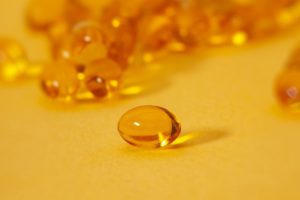
It’s quite common for people to drop hundreds of dollars every month on trendy supplements in search of being stronger, healthier, and more athletic specimen with a raging sex drive.

There’s a stigma about cardio causing muscle loss that sends chilling fear down a meathead’s spine. Maybe you can relate and get a little frightened walking past a treadmill knowing that merely touching it could cause your precious biceps to shrink away.